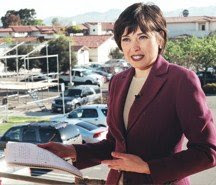Image via Wikipedia
Phase II: Point of No Return
This is when you are forced to act. It’s go time. It's your chance to shine.
Be ready. Avoiding the issue will not make the story go away, it will make the story bigger.
In Public Relations A Values Driven Approach, David Guth says accurate and timely communication is key. Stories can go viral in just hours. Janet Harris, of Upstream Analysis, advises her clients, “You can’t be reluctant," miss the early signals of a crisis or take a day to debate before issuing a press statement.
NASA learned this after the Challenger explosion. The agency went silent for five hours after the accident. But nearly 20 years later -- when Columbia broke apart on re-entry -- it declared a “Shuttle Contingency” within 15 minutes.
Don’t Create Your Own Crisis. If you won’t talk, your competition, critics, disgruntled employees or customers will. Recently I reported on how well-prepared area schools were for Swine Flu. One PIO took forever to return calls and then said “everything is on our website.” The plan was a year-old. The second district touted a huge pandemic plan and explained their strategy. On the news that night, the first district wreaked of vulnerability, the second came off smelling like a rose.
Tip: Know Your PR Reputation. This is where the “R” in PR is important. Reporters remember when you blow them off. And if you have earned a reputation as a “useless tool” on daily stories, don’t expect any newsroom favors come crisis time.

Jennifer, great post. I've done PR for a large financial services corporation for several years. My team has always tried to avoid the conservative, "no comment" approach that many PR professionals in this industry take. We treat reporters as clients and do whatever we can to be responsive to them so we're not viewed as a "useless tool," as you put it.
ReplyDeleteI feel our efforts have definitely paid off -- reporters have grown to trust and respect us because we're accessible. Of course we still have to get buy-in from executives who might be reluctant to respond when the risk is high. But by working hard to educate those executives on our strategy, they've come to trust our judgement. And when crises hit, that trust is invaluable to how the company responds and ultimately how we are perceived by the public.
Sarah
Sarah,
ReplyDeleteThanks for your comment. I find the challenge a lot of PR professionals face is convincing executives communication is important. Those relationships you develop on every-day stories will help you through the tough times. I cannot tell you how many times I have taken my PR friends aside and given them guidance on how to handle a crisis ... telling them what reporters were thinking, wanting and ready to report.
But PR folks who don't build that relationsihp, don't get that benefit.